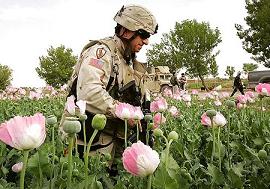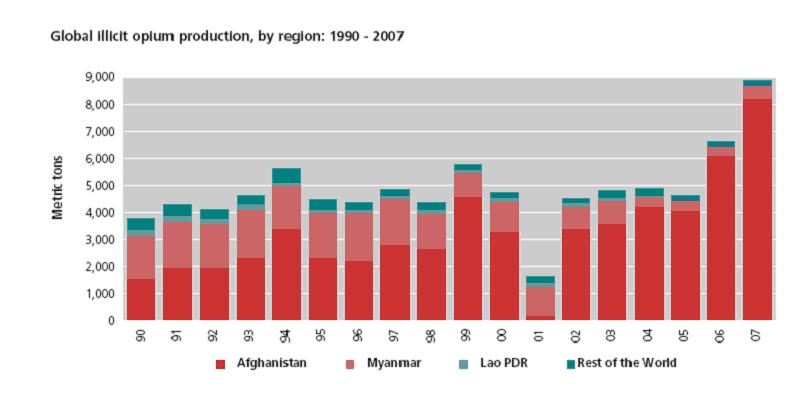
The Afghan War:
Dr John Jiggens
It was common during the opening of the
Why then are there no slogans saying “No blood for opium!”?
The weapons of mass deception tell us that the opium belongs to the Taliban and that the

In the 1960s, when the
The graph below from the UN World Drug Report 2008 shows the astonishing increase in Afghan opium production that followed the
www.globalresearch.ca/index.php
In the 1980s the
To hide
The Soviet army withdrew from
The Taliban emerged from the chaos, dedicated to removing the war lords and applying a strict interpretation of Sharia law. They captured
Under the policies of the Taliban government, opium production in
As a result, 2001 was the worst year for global opium production in the period between 1990 and 2007. During the 1990s, global opium production averaged over 4000 tonnes. In 2001, opium production fell to less than 200 tonnes. Although it was not admitted by the Howard government, which claimed the credit itself,
Following the attack on the Pentagon and the World Trade Centre on 11 September 2001, the armies of the northern alliance, led by US Special Forces, supported by daisy cutters, cluster bombs and bunker-busting missiles, shattered the Taliban forces in
After 2002 Afghan opium production rose to unheard of levels. By 2007,
Schweich wrote in the New York Times that "narco-corruption went to the top of the Afghan government". He said Karzai was reluctant to move against big drug lords in his political power base in the south, where most of the country's opium and heroin is produced.
The most prominent of these suspected drug lords was Ahmed Wali Karzai, the brother of President Hamid Karzai. Ahmed Wali Karzai was said to have orchestrated the manufacture of hundreds of thousands of phony ballots for his brother’s re-election effort in August 2009. He was also believed to have been responsible for setting up dozens of so-called ghost polling stations — existing only on paper — that were used to manufacture tens of thousands of phony ballots.
"Karzai was playing us like a fiddle," Schweich wrote. "The
But who was playing who like a fiddle?
Was it the puppet President or the puppet masters who installed him?
As Douglas Valentine shows in his history of the War on Drugs, The Strength of the Pack, this never-ending war has been a phony contest, an arm wrestle between two arms of the
During the Nineteenth and Twentieth centuries, European powers (chiefly the
Dr John Jiggens is the author of “The killer cop and the murder of Donald Mackay”.
April 21, 2010

